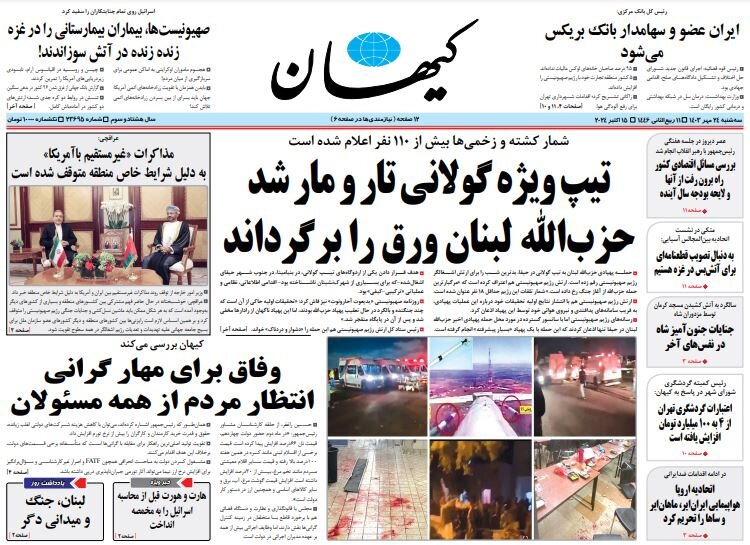Bluff has put Israel in a predicament

TEHRAN - In a note, Kayhan addressed the lack of response from Israel to Iran until now after Iran's missile attack and said: In the first few days after Iran's attack on Israel, the Zionist authorities were boasting that they would immediately respond to Iran, but two weeks later, Radio Farda, seeking to justify Israel's helplessness, said the Hebrew calendar was not considered for Israel's "imminent response" to Iran.
According to two Israeli officials, Israel's non-response to Iran is related to the conversation between Joe Biden and Kamala Harris with the prime minister of Israel; the conversation that Netanyahu has publicly requested to coordinate with the White House regarding Israel's action against Iran and postponed his war minister's trip to Washington until this conversation. Israeli commanders believe that the lack of a strong attack will lead to further attacks by Iran. Netanyahu's regime knows that if Israel makes a mistake this time, it will face completely different strikes from the previous two strikes and it will suffer heavy casualties and damages.
Shargh: Diplomacy in the most difficult condition
Shargh devoted its editorial to Iran's important and extensive diplomatic measures regarding the developments in the region and wrote: Given America's support for Israel's possible attack on Iran, as well as issues such as American bases and soldiers in almost all conservative Arab countries and Iran's relationship with these countries, the situation is greatly sensitive. In a situation that oil prices have increased by 10% over the past two weeks, preventing an attack on oil facilities in the region is an important issue that should be put on the diplomatic agenda. When most Arab countries have held positions that are different from those of Hezbollah and Iran, the way they deal with the issue is important. Iran has turned to diplomacy in a situation where the opposite sides have always used it for building coalitions, building trust, continuing dialogue, and working on diplomatic solutions. Negotiation is the main focus of diplomacy, and even if a negotiation process doesn't produce any tangible results, at least doing it is a victory.
Iran: What "THAAD" can do?
In an analysis, the Iran newspaper discussed the deployment of the American THAAD air defense system in Israel and said: The THAAD anti-missile defense system does not have much chance against Iranian missiles. The Zionist regime has many air defense systems to deal with missile attacks. In addition to these systems, Israel also has the Arrow 3 system. This system was designed and built with the cooperation of the United States to intercept long-range ballistic missiles outside the Earth's atmosphere. However, it took less than a year for this advanced anti-missile system to prove its effectiveness following Iran’s True Promise II operation. According to the official declaration of the Islamic Revolution Guard Corps, more than 90% of the missiles successfully hit the designated targets in Tel Aviv. According to such an experience, it does not seem that THAAD will have a different fate than the joint system of America and Israel, because the United States and the Zionist regime, by combining the features of "THAAD and Arrow", designed Arrow 3 and put it into operation.
Hamshahri: Halt in Tehran-Washington talks through Muscat
In an interview with Hassan Beheshtipour, an expert on international issues, Hamshahri discussed the halt in Iran-U.S. negotiations through Muscat. He said: Some analysts of regional developments have interpreted Iran's decision as an action aimed at putting pressure on Washington to reign in on the Zionist regime. In addition to the special conditions that govern the region, the process followed in the Muscat consultations has also been effective in such a decision. Considering the boring and fruitless process of indirect negotiations between Iran and America in Oman, this process could not produce any results if it continued. What has been more effective in stopping the Muscat process is the critical situation in the region. Controlling the Zionist regime in its daily crimes has become a central priority, which also affects the negotiations in Muscat. Also, the outlook for a resumption of negotiation between Tehran and Washington to lift sanctions is not very clear at least until the presidential elections in the United States. Currently, managing tensions is considered the main priority.
Leave a Comment